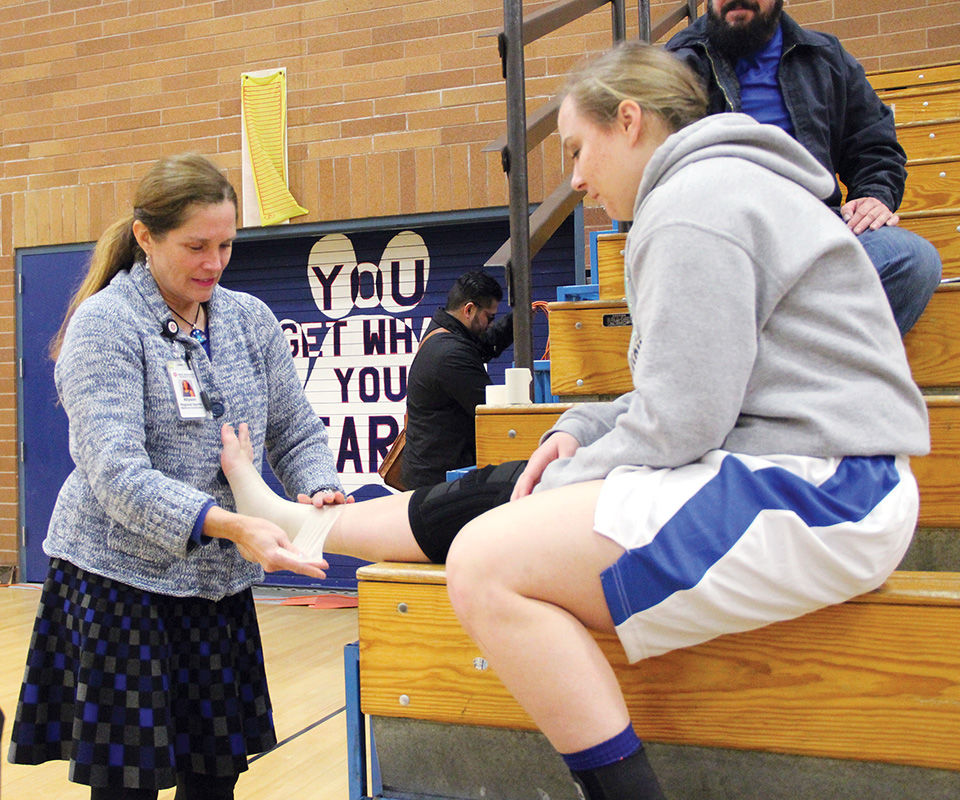
Article reposted from Citizen Tribune
Author: NIK STRENG
“When I first came here, I wanted to improve the health of each person in the area one student at a time,” said Allyson Lee Barton, sports medicine coordinator/athletic trainer for Saint Alphonsus Medical Center-Ontario.
Since Barton came to Ontario in August of 2013, that goal has become more and more of a reality. This year, the medical facility has begun providing nutritional advice presentations for student athletes.
According to Barton, the nutritional advice presentations were born when Saint Alphonsus President Ken Hart connected Barton with dietician Deborah Hampton. The latter had a student intern, Hallie Hopkins, who was able to create the presentations for the student athletes.
Barton said most athletic trainers will have a background knowledge of nutrition that is important for athletes, but not at the level of a dietician. This made collaboration between Barton and Hampton especially important when reaching out to student athletes.
According to Barton, the nutrition classes are important for all athletes, as even those who have a base knowledge of nutrition should stay informed. The presentations Hopkins created use information supported by both the National Athletic Trainers Association and the Oregon School Activities Association.
“We can always use extra help when it comes to the nutrition of our athletes,” Barton said. “The more we’re all saying the same language for these athletes, the more it’ll sink in.”
And the presentations were able to get wide reach in the first year. Hopkins was able to present to student-athletes at Ontario, Payette, Vale, Nyssa and Treasure Valley Community College (all schools that have contracts with Saint Alphonsus).
Barton said the focus of the presentations is how to eat before and after exercise, as well as how to eat on the road.
And the classes were not just for varsity athletes. Junior varsity teams were involved, and even about 320 middle-schoolers also were given presentations.
“We want to be able to teach these younger kids how to take care of themselves,” Barton said. “It’s a prevention program.”
Saint Alphonsus already has received calls from the Vale and Nyssa track and field teams to have Hopkins do another round of presentations in the spring, Barton said.
Another big topic in the nutrition presentation is hydration, which Barton said is a big problem with students in this country.
“We need to get kids off of energy drinks, which they drink instead of sports drinks,” she said. “It’s an epidemic with high school kids. When you take in that caffeine and aren’t drinking sports drinks or water it can lead to heart arrhythmia and seizures. These kids have too much caffeine and sugar in their system.”
Coffee drinks and energy drinks, such as Red Bull or Monster Energy, are often high in caffeine and sugar, while low in calories. But when it comes to a sport drink, that’s not what athletes should be looking for. A sports drink, such as Gatorade, will have electrolytes and carbohydrates to replace what is lost in sweat.
“It suppresses your appetite and helps you stay awake,” Barton said. “It’s a quick and easy method, but it provides a false impression of actual sport performance.”
More than just taping ankles
Barton is one of a four-person team at Saint Alphonsus which works with local schools. Barton covers Ontario and Nyssa; Jenna Lee Ryan (a Fruitland alumna) covers Payette and Vale; Steve Payson covers TVCC and fills in for other trainers if they need to be somewhere else; and Andrew Hammerquist is a recent hire who comes out to help as well.
When Barton arrived at Saint Alphonsus almost five years ago, the hospital’s contract was only with Ontario High School and was only for football.
“Now we go to practices when we can and we are at home events,” she said.
Raised on a dairy farm in upstate New York, Barton said, she knew she belonged with Saint Alphonsus very quickly.
“I have a heart for rural kids because I was one myself,” Barton said.
She attributes a big part of her love of the area to the fact that schools haven’t had a long history of athletic trainers, sometimes leaning on coaches to have a basic knowledge of sports medicine. From her own experiences, Barton said, she knows how important having an athletic trainer on staff can be.
She didn’t even know what an athletic trainer was, she said, until she was on the track and field team in college.
“I pulled a hip flexor and was limping around,” Barton recalled. “My teammate told me to got to the training room, and I was like, ‘What’s that?’ I could barely walk going in, and I could walk out no problem. I was sold.”
Barton has integrated herself into the schools at both Nyssa and Ontario. And many of the student athletes have warmed up to her.
“I treat them like they’re my own kids,” Barton said. “And it’s an honor that the Nyssa kids, and some Ontario kids, call me Mom.”
This article originally ran on argusobserver.com.